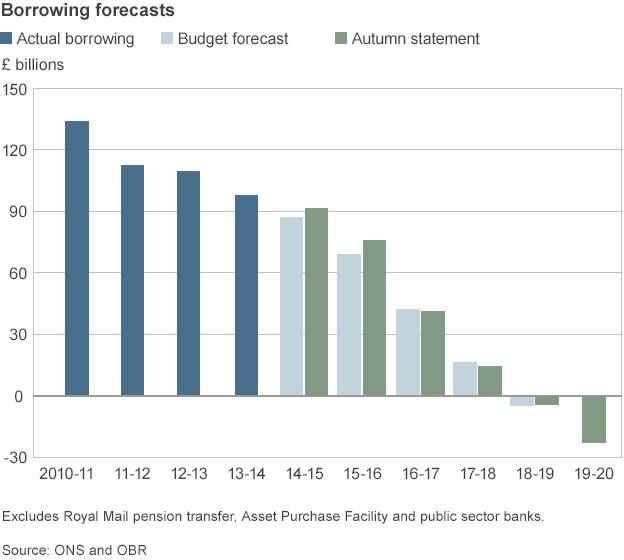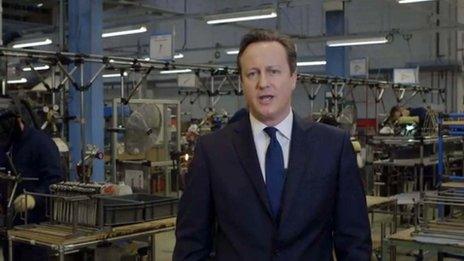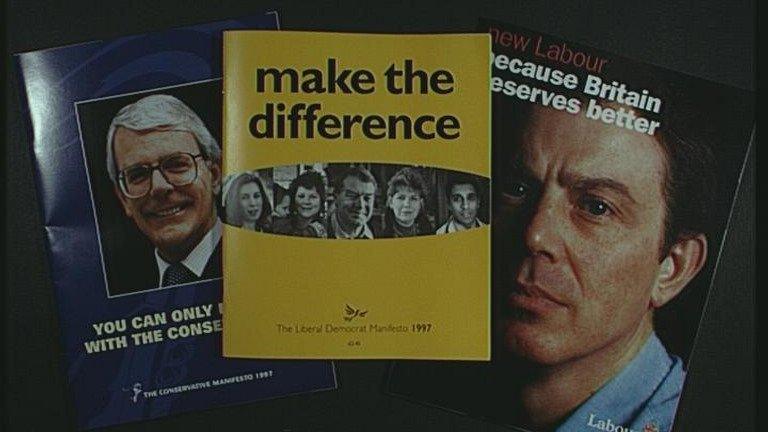David Cameron warns of 'legacy of debt'
- Published
David Cameron: "I say we have a responsibility to act"
Prime Minister David Cameron has urged voters in the forthcoming general election not to pass on a "legacy of debt" to their children.
In a speech launching the first of six themes for the Conservative manifesto, he set out plans to end the £90bn deficit with spending cuts, not tax rises, while raising NHS spending.
This was "fair and sensible" and would not result in "the world falling in".
But Labour leader Ed Miliband said Mr Cameron had "failed" since 2010.
The Conservatives have committed to securing an overall budget surplus, covering current and capital spending, by 2019-2020 at the latest and said their plans "do not involve" any tax rises.
Labour has also vowed to cut the deficit but says it will secure a surplus in current spending by the end of the next Parliament - planning to do so by using a mix of spending cuts and tax increases.
In his Autumn Statement last month, Chancellor George Osborne forecast that annual borrowing would fall progressively over the next four years and by 2018-9, the UK would "go out of the red and into the black for the first time in a generation".
'Road to recovery'
Mr Cameron said an additional £30bn will need to be saved before 2020 to meet these targets and to substantially reduce the level of debt as a share of national output.
The Conservatives envisage that £12bn of this will come from welfare cuts, £13bn from a further squeeze on departmental budgets and £5bn from a further crackdown on tax avoidance.

In a speech in the east Midlands, the Conservative leader said the plans were "difficult but doable", arguing they amounted to a 1% reduction in government spending each year.
There was, he claimed, "not a family and a business" that could not make that level of savings.
'Path to ruin'
Mr Cameron said voters faced a choice of "staying on the road to recovery or choosing the path to ruin".
"When you look at the children you love, do you want to land them with a legacy of huge debts?" he said. "Do you want to limit their future, to make life more difficult for their generation, because we refuse to do the right thing in our generation?
"I say we have a responsibility to act. We can get Britain back to living within our means in a way that is fair and sensible and secure."
While a Conservative government would "secure a better future", he claimed a victory for other parties would mean "confusion, uncosted plans, the spectre of more debt, the shadow of more taxes on your family, home and business".
He warned that "the writing is on the wall" for the country if it fails to deal with its debts, the consequences of which could mean higher taxes, higher interest rates and less money to spend on public services such as hospitals and schools.
NHS pledge
Despite the anticipated spending squeeze between 2015 and 2020, Mr Cameron said "not a penny" would be cut from the NHS budget over this period, so "everyone gets the care they need".
The other themes on the Conservatives' manifesto-shaping list are jobs, taxes, home-ownership, education and retirement.
Mr Cameron said other subjects, such as immigration, would be addressed directly "through the prism" of these subjects.
Labour said the government had palpably failed to hit the deficit reduction targets it set itself in 2010.
Speaking at a question-and-answer session in Stevenage, Labour leader Ed Miliband said "the reason David Cameron and George Osborne have failed on the deficit is because they have failed on living standards".
"Unless we have higher wages and living standards, we won't get the revenue to reduce the deficit. Their plan will keep failing on living standards and therefore keep failing on the deficit.
"And now they want to go even further: back to the 1930s on public spending."
'Failure'
Mr Miliband said the fact the NHS was not one of his opponent's main themes showed it was not a priority for the Conservatives.
"No wonder David Cameron has gone from saying the NHS were the three most important letters to him to the health service becoming the subject that dare not speak its name," he said.
The Liberal Democrats have said they would seek to pay down the current budget deficit by 2017-18 and after that, ensure that spending on the NHS rises in line with growth in the economy.
"The vast majority want to balance the books fairly and for our country to turn the corner as soon as the job is done," said the party's economics spokesman and current Treasury minister Danny Alexander. "Only the Liberal Democrats will deliver that."
UKIP migration spokesman Steven Woolfe MEP said: "Despite all his rhetoric last year, David Cameron's omission of immigration as a major topic during this year's election is yet another example of the prime minister running away from debating the big issues.
"Immigration is the one common theme across all areas of policy, whether its putting pressure on the NHS with a growing population, driving down wages and affecting jobs, leading to overcrowding in schools and falling education standards or posing big questions about social cohesion. The matter absolutely cannot be swept under the carpet."
- Published1 January 2015

- Published25 February 2015
